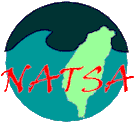|
 |
|
|
CALL FOR PAPERS
Changes, Continuity and Contestations in Taiwanese Society
- Invitation to submit proposals
- Submission guideline
- Travel grants
- Proposal review process, notification & obligations
- For further information
- Date: June 19-22, 2003
- Location: Rutgers University, New Brunswick, NJ, USA
- Submission deadline: Extended to December 15, 2002
- Acceptance notification: February, 2003
INVITATION TO SUBMIT PROPOSALS
The North American Taiwan Studies Association (NATSA) is soliciting your contributions to next year's Annual Conference program on the theme of Changes, Continuity and Contestations in Taiwanese Society. As an organization seeking to promote interdisciplinary discourses of Taiwan in its myriad aspects, we are currently accepting proposals in one of three session formats to accommodate a wide range of intellectual and professional dialogues both formal and informal. Please submit your individual or group proposals by November 30th, 2002, and help to enrich this year's thematic contents. (For an elaboration of the theme, visit http://natsc.org.)
The topics of interest include, but are not limited to, the following:
- Theoretical or methodological re-examination on Taiwan studies.
- Cultural changes and cultural studies: new cultural phenomena, media studies, popular culture, trans/national tourism, traveling cultures, religion studies, gender studies, global/local relations, body politics and identity politics.
- Political economy of Taiwan's development: international trade, economic policies, industrial structures, labor relations, and network capitalism in global or local contexts.
- Political changes and public policy: democratization, state/society relations, electoral politics, legal studies, urban and environmental planning, welfare and health care.
- Social justice and social movement: distribution justice, social rights, social movements, and civil society.
- International relations: national security, Taiwan-China relations, Taiwan-U.S. relations, NGO development, Taiwan charity activities in the international, and foreign policies.
- Language and literature: language and ideology, language planning, multilingual studies, orthographic issues, vernacular literature, author studies, colonial literature, nativist literature, comparative literature, literature critique.
- Taiwanese history: colonial history, collective memories, and oral history.
- Education: educational reform, education and ideology, issues of community college planning, democratic education, and multicultural education.
- Aboriginal studies, ethnic politics, nationalism, and transnationalism: aboriginal languages, culture and policies, ethnic relations, ethnic/national identities, nationalist movements, Taiwanese diaspora, transnational movements.
SUBMISSION GUIDELINE
To encourage initiatives from conference participants and provide diverse means of presentation and discussion, submissions in the following three formats are welcomed this year:
1. Individual Papers
Individual papers present results of individual or collaborative research. Submissions on any of the aforementioned topics are welcome. To submit an individual paper, one must submit a title and a 250-300-word abstract including the purpose and objectives, methodology and research outcome.
2. Proposed Panels
Proposals for a full panel that consists of 3 to 4 paper presentations as related to a shared theme are encouraged. Interdisciplinary panels are particularly welcome. To submit a panel proposal, the panel organizer(s) must submit a title and a 400-500-word panel abstract (including the purpose and objectives and expected outcomes) along with abstracts of individual papers (with the same requirements as individual papers).
3. Working Group Sessions
Working groups are informal round-table discussions that provide a forum for developing joint research agenda and/or opportunities for feedback on exploratory works in progress. To submit a working group proposal, one must submit a title and a 250-300-word abstract including the purpose and objectives, expected outcomes and names of confirmed participants.
All abstracts for accepted papers, panels and working groups may be published in the conference proceedings. The abstract can be written in English or Taiwanese languages (usually referred but not limited to Mandarin, Holo, Hakka and Aboriginal languages).
Please submit your abstract for individual papers, proposed panels, and working-group sessions online at http://natsc.org/Conference/Submit/. E-mail submissions are not accepted. To ensure a fair review process, additional guidelines apply and will be detailed on the submission form.
TRAVEL GRANTS
Paper presenters may be eligible for travel grants to attend the conference. Details will be announced on the website in the future.
PROPOSAL REVIEW PROCESS, NOTIFICATION & OBLIGATIONS
Proposals are evaluated in the form of blind reviews by scholars from relevant fields. Criteria for inclusion in the conference program include:
- The quality and clarity of the research question, theoretical framework, methodology, and major arguments and findings;
- Contribution and significance to Taiwan studies;
- Program considerations, such as panel arrangements.
Proposal contributers can expect to receive e-mail notice of proposal status in February, 2003. Authors of accepted abstracts are required to submit a full paper following guidelines to be announced in 2003. The Conference Preparatory Council reserves the right to limit the number of accepted papers by any one author or group of authors.
For further information:
- For updates and announcements on the conference, please visit the Association's website at http://natsc.org.
- For general questions regarding submission formats or contents, please contact our Planning Committee via abstract@natsc.org. (Note that as stated, proposals via e-mail are not accepted.)
- For questions regarding the conference and travel subsidies, please contact our Administrative Committee via contact@natsc.org.
9/1/2002
Last updated on December 2, 2002 |
|||||
|
|
